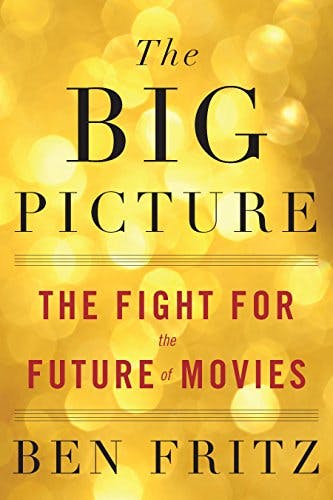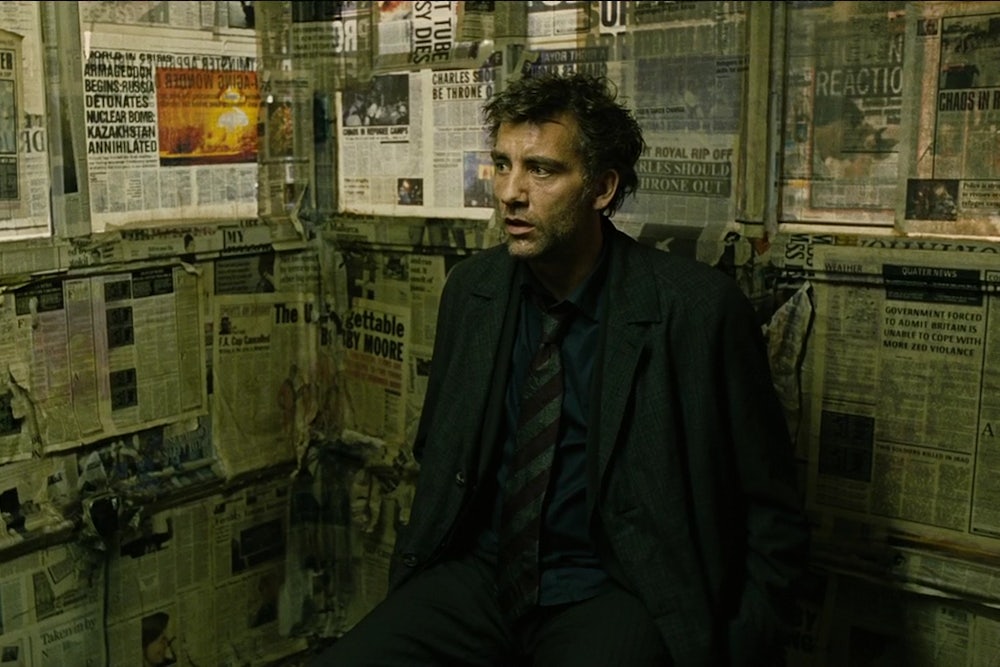The movie business has changed dramatically over the past decade. Fewer people are going to the movies, and in response studios are investing more of their resources in big-budget film franchises that can fill seats and sell merchandise, at the expense of adult dramas and comedies. At the same time, tech companies like Netflix and Amazon are spending hundreds of millions of dollars on television and film production, while transforming the way people watch television and film. In The Big Picture, a compelling look at the recent history—and future—of the movie business, Wall Street Journal reporter Ben Fritz comes to the conclusion that, amidst these changes, we may be living in a golden age of visual content. I spoke to Fritz about movie studios’ growing reliance on blockbusters, what’s driving Netflix and Amazon, and why a movie like Children of Men probably wouldn’t get made in 2018. This interview has been edited and condensed for clarity.
If there’s a big idea in The Big Picture, it’s that the age of the movie star and the star director is over. The age of the franchise has arrived. How did we get here?

Unbeknownst to a lot of us, the old way of making movies where movie stars mattered a lot, where directors were powerful, where it made sense to have a broad array of films—original dramas for adults, romantic comedies, etc.—was driven by certain economic forces that have changed. We just thought that studios had to make every kind of movie. But it turns out that when the economic forces change, the types of movies that studios make change as well.
Those changes include the rapid decline of DVD sales. DVD revenue was so abundant before; people were just buying random DVDs from Walmart and Target because they were cheap and it was easier than going to Blockbuster. In that period, it was much easier to make money from a film and much harder to lose money, so you could make a more diverse array of films. The international market has also become so important that a film that’s culturally specific in any way loses its financial viability. You have to worry about appealing to people in Shanghai and Moscow and Rio.
The rise of the golden age of television and streaming—once that occurred, people’s calculus changed. It didn’t make sense to leave the living room and spend the money to risk seeing something on the big screen, when you have so many great choices to watch on your TV or your tablet. Before, the only way to see high quality dramas for adults was to go to the movie theater—there were very few of them on TV.
2017 was an outstanding year for movies but it does seem like Oscar-bait movies are working on a smaller scale, for a smaller audience, in part because Hollywood has stopped investing in big budget Oscar-bait movies that aspire to a mass audience. In The Big Picture, you argue that three of my favorite recent movies—Michael Clayton, Captain Phillips, and Children of Men—would have a much hard time getting made right now.
That specialty market will certainly survive. If you live in a big enough city you’ll be able to see whatever the next Ladybird is in a few years. But most people won’t. They’ll see it on streaming or whatever. And that will be fine. But Children of Men, that’s a great example. I don’t know what it’s budget was—$80 million maybe. It’s not cheap to make that film. You’re making a film that’s really worth seeing on a big screen. But there’s no Children of Men cinematic universe. There’s no franchising. There are no tie-ins. There are no sequel possibilities. That’s a one-off film and that’s the type of thing that won’t get made anymore. It’s also the kind of thing that’s tough to replicate for a streaming service. It’s the kind of movie we’re losing and that’s a bummer.
Hollywood has never been more dependent on franchises, as you argue both in your book and in a Wall Street Journal piece from last week.
Black Panther is 23 percent of the box office so far this year. That film alone. The top ten films have been 58 percent of the box office this year.
That strikes me as a recipe for disaster.
It is undeniably bad news for movie studios and for anybody who wants to see diversity in movies being produced. It’s great for Disney, which made Black Panther, and the theaters that showed it. But there are so many other films that lost as a result. That means that the studios are inevitably going to make fewer films and pour even more resources into big-budget event franchises that can hopefully be the next Black Panther. They have to respond to consumer behavior and if consumers basically only go and see a few movies a year, and only a handful of films succeed every year, then studios rationally have to make fewer films and pour more resources into movies that fit the narrow criteria of a film that succeeds.
Marvel Studios, you write in the book, was basically created because Marvel wanted to sell more toys and was frustrated that studios weren’t working on their toy-selling schedule. How has merchandising affected the film industry?
The movie business is not a great business in and of itself. Even the level of success that Disney’s having with Marvel and Star Wars and everything, the profit margins are not fantastic. You have to deploy a lot of capital and you’re going to have some flops. The smart companies these days are in the movie business for another reason besides just making profits from movies. Disney of course wants to make money from the films. And it does. But it’s really in it to create intellectual property that drives theme park attractions and its consumer products business.
Soon it will drive the streaming platforms that studios are launching. Universal is owned by Comcast. It’s important for Comcast to have content that it can distribute to its cable, on-demand, and internet platforms. The companies that are in the movie business just to make money from movies—they usually don’t do very well.
What about Netflix and Amazon? What does success look like for them?
It’s complicated. Normally I would say that you should generally trust that a company is not wasting a lot of money. But a company like Amazon is so big that whatever it’s spending—$1 billion, if it ends up spending that much on its new Lord of the Rings series—is almost irrelevant. So the criteria for success is muddy.
We have no idea how many people are watching, it’s not like there’s box office or Nielsen ratings. And they’re not making it so that a particular show or movie itself makes a profit. Amazon makes Lord of the Rings because Prime subscribers will be more engaged in using the Amazon apps and watching it on their Fire or whatever. Therefore, ultimately, viewers will keep subscribing to Prime and buy more stuff from Amazon. That’s very indirect. The same thing goes for Netflix, even though it isn’t as big as Amazon.
Each show is a tiny bit of money compared to what these companies do overall. And all Wall Street cares about with them is subscriber growth. They don’t care about how any individual show or movie performs. So we don’t know how these shows are doing—all we know is whether or not it’s something that everybody is talking about. We have a sense that Stranger Things seems like a hit because people were talking about it. They claimed Bright was a hit but it clearly did not impact our culture the way that any hit movies released in theaters have.
You argue that these changes have largely been beneficial. I was wondering if you could conclude by offering an optimistic and a pessimistic forecast for the next several years.
The thing that’s being damaged is not moviemaking, I realized while making this book, it’s theatergoing. If you start to separate the idea of movie theaters from movies, then in fact it’s a great time. A lot of movies are being made for streaming platforms.
It also used to be really clear what was a movie, what was a TV show—sitcoms, police procedurals, maybe soap operas, there were very few limited boxes in which TV shows fit. Now you have every kind of TV show. You could have a TV show that’s only eight episodes or a limited series that’s only three or four episodes. They’re making original films on Netflix and Amazon—to me it’s become much more of a spectrum, between what’s on TV and streaming and what’s on film. Yes, there are things that we lose when cinema-going is a part of our culture. But for me the most important thing you should care about is that quality visual content is being created. There’s more interesting and diverse storytelling coming out, even if it’s not coming out on the type of screen that some of us would prefer. This is clearly overall a better world for entertainment producers and entertainment consumers than it was 20 years ago.
My pessimistic forecast is that the great thing about the music business right now with Spotify or Apple Music is that you subscribe to one service to get everything. But when content is being used to attract you to a certain service or to get you to use a certain kind of hardware, whether its Apple products or Amazon, then we’re not all going to get the same content. And how many of these services do you have to subscribe to get them all? It’s going to be crazy. It’s going to be a very fragmented content world and people aren’t going to even know where the best stuff is. It’s going to be really hard for things to break through. That’s a bummer. It’s sad for America when we don’t have things that we’re all watching and talking about together.
